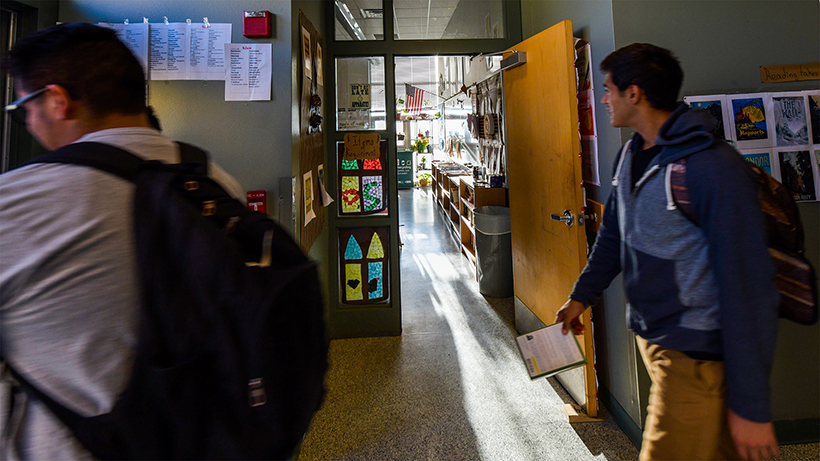This post was written by NCTE members Paula Patch and Greg Hlavaty.
As first-year writing teachers, our primary experience is teaching traditional students at a private liberal arts university, which requires typical writing pedagogy: writing as process, awareness of audience, thinking critically. For years, we practiced this craft and thought we always knew what to expect.
Our worlds shifted a bit in 2013, when we, as lecturers in the English department, were asked to design and teach a non-credit writing seminar for high school students in the local community. We came up with College Writing for High School Juniors, which exists somewhere between a non-credit course and a typical college writing class, and meets the following goals:
Through specific focus on application essays and argumentative writing, students develop an effective writing process, practice writing for multiple audiences and purposes, learn to ask for and respond to feedback on writing, learn the elements of argument, practice using evidence and reasoning to support an argument, learn to develop research questions, and learn to find and evaluate material in academic and popular databases.
Because the goals mirror that of a typical first-year writing course, we expected a similar experience to our college courses, but what we got was more complicated, and often more rewarding, than expected.
While we could fill a book with what we’ve learned from teaching high school juniors, we’ll just focus on some notable lessons:
- Students appreciate writing in different genres, especially ones that require them to be creative or imaginative. This offers them a genuine respite from their standard AP, SAT, or ACT essays.
- Still, they care about succeeding on standardized tests. Sounds obvious, we know, but motivated students want more than novel writing projects; they want assurance that they can succeed in traditional testing formats, such as AP exams. This challenged us to combine novel assignments with traditional skills. At the same time, we learned a lot about which AP exams and classes truly helped students learn to write and think well, along with which AP classes students seem to enjoy most. Hint: It’s not AP Language and Composition; it is AP US History.
- Students like to be known as people. While college students frequently maintain a professional distance, high school students will often bring their excitement (and their problems!) to class with them. In other words, you’re not just teaching content, you’re teaching people, and that’s a lesson we carried back to humanize our college courses.
- It’s energizing to teach to a different age group. As non-tenure-track faculty, our course loads can be pretty limited, so a chance to revise our courses for a high school age group brought a fresh perspective to our pedagogy.
- Non-credit, non-required courses* are a tough sell, especially to busy teens. Most students are there because of parental pressure, so the instructor has to set a friendly and fun tone from the first day. Homework completion is sporadic; the best assignments often happened in class. This made us rethink the homework we assign—or don’t—in our credit-bearing college classes.
- Many students have never written drafts or commented on a peer’s work. We learned to model appropriate ways to respond to another’s work, and to respond to disagreements.
- Not everyone has access to a laptop or the Internet at home. Because our college students are affluent, it’s easy for us to forget that some students lack access to technology (or to transportation—several students needed to come late due to getting rides from parents).
The initial purpose of this course was to provide a critical writing and inquiry experience for high-achieving high school juniors in the Elon community. We expected, and achieved, that goal. Now in its seventh year, the course has matured to serve a corollary purpose: to provide a space for reflective teaching and to help writing teachers understand just what high school students are experiencing. The type of information one can gather from conferences or scholarship is offered firsthand by interacting with high school students, something few of our colleagues may do.
It’s messy. It’s hard. It’s real.
It is, in short, writing. With people.
And we like it.
*This year College Writing for High School Juniors moved from noncredit to a 2-credit, pass/fail course. We’re curious to see how this shift will affect student engagement and course completion rates.

NCTE member Paula Patch is a Senior Lecturer in English at Elon University, where she coordinates the first-year writing program and has taught composition and grammar courses since 2006. You can follow her on Twitter via @profpatch.
 Greg Hlavaty is a Lecturer in English at Elon University, where he teaches writing and literature courses. You can follow him on Twitter via @greg_hlavaty
Greg Hlavaty is a Lecturer in English at Elon University, where he teaches writing and literature courses. You can follow him on Twitter via @greg_hlavaty

